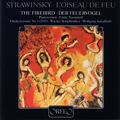
NEWS
REPORTS
|
|
ORFEO International
News
August 2008
Wolfgang Sawallisch's Eighty-Fifth Birthday
It has been some fifteen years since his last operatic performances on the rostrum of the Bavarian State Orchestra, but his hometown of Munich is not the only place to have fond memories of him. The person of whom we speak is the conductor, Wolfgang Sawallisch
Wolfgang Sawallisch
Foto: Sabine Toepffer, who will be celebrating his 85th birthday on 26 August 2008. 
C 236 901 B

C 039 101 A

C 091 841 A

C 168 881 A

C 024 821 A

C 145 851 A

C 160 851 AHis conducting for the music dramas at the Bayreuth Festival of Wagner’s Tristan und Isolde, Der fliegende Holländer and Lohengrin between 1957 and 1962 are a work of legend. After starting his career in Augsburg in 1947 he quickly established himself as one of the great maestros, also gaining notoriety with principal positions in both Aachen and Wiesbaden during this time. Together with Wieland Wagner as director in the 1960s in Cologne he successfully worked on the Ring des Nibelungen. During his artistic directing time at the Bavarian State Opera, where he had already been given the role of musical director by 1971, he staged the complete operatic works of both Richard Wagner and Richard Strauss. Records for many of these are kept by Orfeo, including Strauss’ Schweigsame Frau dating from the beginning of this Munich era with Reri Grist and Kurt Böhme. Most notably, however, this includes Wagner’s early music dramas, Die Feen, Das Liebesverbot and Rienzi, all of which were recorded in Wagner’s commemorative year of 1983. Sawallisch, as was usual, managed to put together a top vocal ensemble. Alongside already established stars, such as Hermann Prey and René Kollo, he also took under his wing a number of young talents, including Pamela Coburn, Sabine Hass and Cheryl Studer.
However, 
C 241 911 A

C 006 061 A

C 044 831 A

C 112 851 A

C 426 981 Bhis operatic repertoire was in no way limited to just German composers: Evidence of this can be found in his production of Il tabarro and Gianni Schicchi by Puccini, both in German with Dietrich Fischer-Dieskau – the former seeing Fischer-Dieskau partnered with Julia Varady in the one-act opera. And indeed it was with this pair that Wolfgang Sawallisch recorded Arabella by Richard Strauss. Also of note from his Italian repertoire are the impressive premiere recordings of Mosè by Gioachino Rossini with Ruggero Raimondi as lead, once again showing Wolfgang Sawallisch’s astute direction of great choir scenes.
Wolfgang Sawallisch was also an accomplished pianist, held in high esteem as an accompanist for personalities like Elisabeth Schwarzkopf, Margaret Price – the line-up on the first Orfeo recording for a programme of Schubert pieces – and again for Dietrich Fischer-Dieskau and Hermann Prey. Wolfgang Sawallisch can also be heard on CD with both baritones in recitals from the „Salzburg Festival“ series, in which his performances as concert conductor with the London Symphony Orchestra from 1973 also appear. Another high point of his treatment of Richard Strauss’ stage works is Ariadne auf Naxos, which saw him take to the rostrum with the Vienna Philharmonic in Salzburg in 1982. Not only during his time in Munich, but increasingly so as principal conductor of the Philadelphia Orchestra (1993–2003), did Wolfgang Sawallisch turn towards the concert repertoire. He enjoyed similar prestige with the Vienna Symphony Orchestra, successfully playing the „light muse“ while conductor laureate between 1960 and 1970 – which can be heard on a Johann Strauss festival concert recording from 1967. Until the end of his conducting career in 2006 he managed to combine this with his great interpretations of symphonic and sacred Romance works. Exemplary of this is Ein deutsches Requiem by Johannes Brahms, which he recorded with the Symphony Orchestra of the Bayerischer Rundfunk (Bavarian Broadcasting). Together with this orchestra he compiled such rarities as Carl Maria von Weber symphonies, as well as preludes and interludes from Hans Pfitzner’s Oeuvre. In addition, the fact that Wolfgang Sawallisch was a sometimes underestimated Bruckner conductor is clear from the recordings, which were created with the Bavarian State Orchestra from symphonies 1, 5, 6 and 9 of the master.
As well as these main areas from the 19th Century, Wolfgang Sawallisch was also committed to working on the contemporary, performing premieres of compositions from Günter Bialas, Gottfried von Einem, Wilhelm Killmayer, Gerhard Wimberger and Ysang Yun. The Orfeo catalogue also has the premiere of Media in vita by Herbert Blendinger which Wolfgang Sawallisch launched during one of the academy concerts of the Bavarian State Orchestra. Pieces from both during and after the late Romantic era of the 20th Century, like Stravinsky’s The Firebird, Hindemith’s Requiem – both with the Vienna Symphony Orchestra – or Wilhelm Furtwängler’s Third Symphony again with the Bavarian State Orchestra are further eloquent examples of Sawallisch’s inexhaustible musical versatility.
top |
|

ORFEO
Chormusik & Oratorien
Edition zeitgenössisches Lied
Kammermusik
Lied
Musica Rediviva
Oper
Recital
Symphonie & Konzert
Weihnachten
ORFEO D'OR
Bayerische Staatsoper live
Bayreuther Festspiele live
Deutsche Oper am Rhein
Salzburger Festspieldokumente
Wiener Staatsoper live
Wiener Symphoniker
Dirigenten
Große Sänger d. 20. Jh.
Orchesterkonzerte
Quartette
Solisten
|